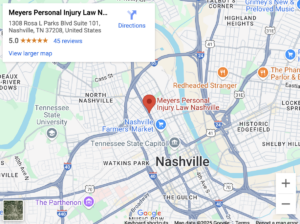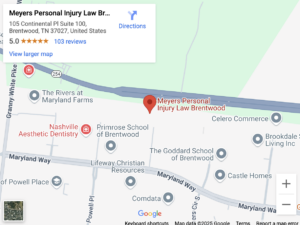
Personal injury law can feel confusing if you’ve never filed a claim before. However, the truth is that so long as you were injured by someone else’s actions (or inaction), there’s at least a chance you’re entitled to compensation. Keep reading to learn the answers to some of the most frequently asked questions (FAQs) we receive about personal injury cases, and contact an attorney for a free case review if you need help.
What Is a Personal Injury Claim?
A personal injury claim arises when someone’s wrongful conduct—such as negligence or intentional harm—causes another person to get hurt. You can file a claim in Tennessee if you’ve suffered losses like medical bills, missed wages, and pain and suffering due to another party’s actions. Common scenarios include car crashes, truck collisions, slips and falls, workplace accidents, defective products, and more.
By filing a claim, you’re seeking compensation from the person or organization that harmed you (or, more likely, their insurance provider). A settlement or court award can help cover your financial and emotional burdens so that you can move forward in your life.
How Do I Know if I Have a Viable Case?
Most personal injury cases are based on negligence. To prove negligence in your personal injury case, you will have to establish the following:
- Duty of Care: The other party was legally responsible for acting with care, such as obeying traffic laws or maintaining safe premises.
- Breach of Duty: They violated that responsibility by driving recklessly, ignoring hazards, or acting unreasonably.
- Causation: Their actions caused your injuries.
- Damages: You suffered real harm—like medical costs or pain and suffering—as a result.
Consulting an attorney is wise, even if you’re unsure whether these elements are satisfied. A qualified lawyer can evaluate your situation, gather evidence, and explain your odds of success.
Do I Need a Lawyer To Handle My Personal Injury Case?
While you’re not legally required to hire a lawyer, doing so can often improve the outcome of your claim. Insurance companies are known to minimize or deny legitimate claims, and navigating the legal system can be time-consuming if you’re unfamiliar with it. A lawyer can:
- Investigate your accident and gather evidence
- Negotiate with insurers to pursue a fair settlement
- Advise you on whether to accept an offer or file a lawsuit
- Represent you at trial if negotiations fail
Having experienced counsel also frees you to focus on your health and other responsibilities while your case proceeds.
How Is Fault Determined?
Tennessee follows a modified comparative negligence rule. Each party’s actions are assessed to assign a percentage of fault. If you’re found to be less than 50% responsible, you can still recover damages, but your share of the blame will reduce your total award. If a court decides you’re 50% or more at fault, you’re barred from collecting compensation.
Because of this law, insurance companies often try to pin at least some blame on you to lower your payout. A strong lawyer can gather clear evidence in your favor and work to minimize the amount of fault you’re assigned.
How Long Does a Personal Injury Case Take?
Personal injury cases can vary significantly in length. Some wrap up within a few months through a settlement, while others can continue for a year or more if the facts are complicated or the insurer resists. Here’s an outline of the typical process:
- Initial Consultation: You can speak with a lawyer to discuss your situation and see if you have a valid claim.
- Investigation and Demand Letter: Your lawyer will collect evidence and send a demand letter to the at-fault party’s insurer.
- Settlement Negotiations: Most cases are resolved at this stage, but it may take multiple rounds of offers and counteroffers.
- Filing a Lawsuit: If no agreement is reached, you may file a complaint in court.
- Discovery: Both sides share evidence, conduct interviews, and refine their arguments.
- Trial: If negotiations fail, the case might proceed to trial, where a judge or jury decides on liability and damages.
Your lawyer should keep you updated at each stage, explaining your options so you can make confident decisions.
What Kinds of Compensation Can I Recover in a Personal Injury Case?
Typically, you can pursue two forms of compensatory damages following an accident: economic and non-economic.
- Economic damages cover medical bills, rehabilitation costs, lost wages, property damage, and other measurable expenses.
- Non-economic damages account for more personal losses, such as pain and suffering, emotional distress, and reduced quality of life.
In rare instances where the at-fault party’s actions are extremely reckless or malicious, punitive damages may be available to punish wrongdoing.
Do Most Cases Go To Trial?
Most personal injury cases don’t end up in court in the first place, let alone trial. Instead, they settle before reaching those stages (note that negotiations can still continue once a lawsuit has been filed and before trial). Trials involve more time, costs, and risks for both sides, so settling often makes sense if the offer is fair.
However, if the insurance company won’t negotiate reasonably, heading to trial could be the best route. Having an experienced trial attorney on your side in these circumstances can make all the difference in the outcome of your case.
Contact a Nashville Personal Injury Lawyer for a Free Consultation
If you’ve been hurt in an accident caused by someone else’s negligence, you’re not alone. An experienced attorney can help you navigate insurance claims, gather the evidence needed for a strong case, and fight for a fair settlement or verdict. Reach out to Meyers Personal Injury Law or call (615) 258-9000 today to get started with a free consultation.



